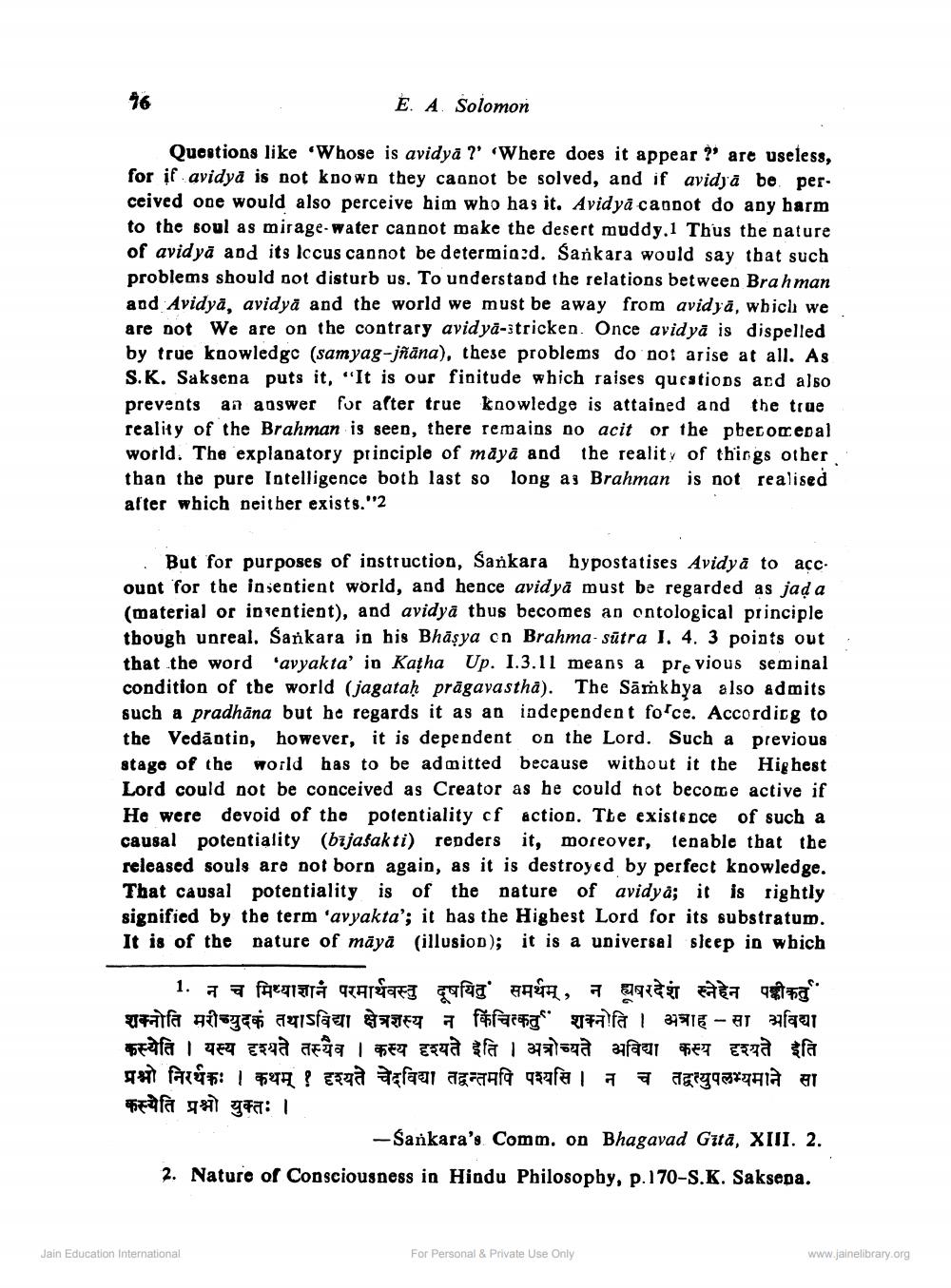________________
16
E. A Solomon
Questions like "Whose is avidyā ?' 'Where does it appear ?' are useless, for if avidya is not known they cannot be solved, and if avidyā be perceived one would also perceive him who has it. Avidyā caonot do any harm to the soul as mirage-water cannot make the desert muddy,1 Thus the nature of avid ya and its lccus cannot be determin:d. Sankara would say that such problems should not disturb us. To understand the relations between Brahman aod Avidyā, avidya and the world we must be away from avidyā, which we are not We are on the contrary avidya-stricken. Once avidyā is dispelled by true knowledge (samyag-jñāna), these problems do not arise at all. As S.K. Saksena puts it, “It is our finitude which raises questions ard also prevents an answer for after true knowledge is attained and the true reality of the Brahman is seen, there remains no acit or the pberomenal world. The explanatory principle of māya and the reality of things other than the pure Intelligence both last so long as Brahman is not realised after which peither exists."'2
But for purposes of instruction, Sankara hypostatises Avidyā to acc. ouot for the insentient world, and hence avidyā must be regarded as jad a (material or insentient), and avidya thus becomes an ontological principle though unreal. Sankara in his Bhāşya on Brahma-sūtra 1. 4. 3 points out that the word 'avyakta' in Katha Up. 1.3.11 means a previous seminal condition of the world (jagataḥ prāgavastha). The Sāmkhya also admits such a pradhāna but he regards it as an independent force. Accordiog to the Vedāntin, however, it is dependent on the Lord. Such a previous stage of the world has to be admitted because without it the Highest Lord could not be conceived as Creator as he could not become active if He were devoid of the potentiality of action. The existence of such a causal potentiality (bījafakti) repders it, moreover, tenable that the released souls are not born again, as it is destroyed by perfect knowledge. That causal potentiality is of the nature of avidya; it is rightly signified by the term 'avyakta'; it has the Highest Lord for its substratum. It is of the nature of māyā (illusion); it is a universal sleep in which
___1. न च मिथ्याशानं परमार्थवस्तु दूषयितु समर्थम् , न घषरदेश स्नेहेन पक्षीकर्तु शक्नोति मरीच्युदकं तथाऽविद्या क्षेत्रज्ञस्य न किंचित्कतु शक्नोति । अत्राह -सा अविद्या कस्येति । यस्य दृश्यते तस्यैव । कस्य दृश्यते इति । अत्रोच्यते अविद्या कस्य दृश्यते इति प्रभो निरर्थकः । कथम् १ दृश्यते चेदविद्या तद्वन्तमपि पश्यसि । न च तद्वत्युपलभ्यमाने सा कस्येति प्रभो युक्तः ।
-- Sankara's Comm. on Bhagavad Gita, XIII. 2. 2. Nature of Consciousness in Hindu Philosophy, p. 170-S.K. Saksepa.
Jain Education International
For Personal & Private Use Only
www.jainelibrary.org




